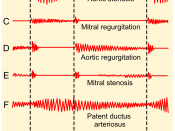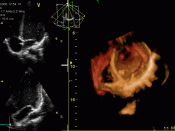Heart valves can have two main things wrong with them. Regurgitation is when the valve does not close completely. This causes the blood to flow backward instead of forward through the valve. Another major problem is stenosis, when the valve opening becomes narrowed or does not form properly, inhibiting the ability of the heart to pump blood to the body. Heart valves can have both malfunctions at the same time. When heart valves fail to open and close properly the heart can't pump blood to the body.
In many cases, there is nothing you can do to prevent heart valve disease. It is often caused by a disorder present at birth or old age. If you have strep throat make sure you get treatment because it can lead to rheumatic fever, which can lead to heart valve disease. You can help to prevent it by not smoking, being over weight, having high blood pressure, having a sedentary lifestyle, and reducing stress in your life.
Some risk factors of heart valve disease are a family history of heart disease before age 55, diabetes mellitus, high blood pressure, aging men and women, smoking cigarettes, people who are overweight by 30 percent, people with sedentary lifestyles, and stress.
The symptoms of heart valve disease are chest pain, migraines, fatigue, dizziness, low or high blood pressure, shortness of breath, and abdominal pain. Some of the causes of heart valve damage are changes in the heart valve structure due to aging, damage from a heart attack or infection, birth defect, and syphilis.
Heart valve disease may be suspected if the heart sounds heard through a stethoscope are abnormal. This is usually the first step in diagnosing a heart valve disease. A heart murmur can often indicate valve regurgitation. Doctors use tests such...


